Sudan Government Structure
- In addition to the 13-member Supreme Council of the State and seven advisors, 300-member Legislative Assembly; One Supreme Judge, one Attorney General, one Prime Minister, 27-minister Federal Cabinet, equal number of Under-Secrtaries, and Secretary-Generals, 16 units, 11 General Directorates under the jurisdiction of the Federal Cabinet of Ministers; 34 units affiliated to Cabinet Affairs Minister; 18 Governors, 270 State Ministers in 16 States, 270 Ministers.
- · There are several public corporations, more than 500 registered non-governmental organizations, more than 26 trade unions, over 100 political parties, hundreds of companies, more than 9000 Resistance Committees in 189 municipalities in sixteen states, uncountable non-registered societies and associations in addition to religious and clan fraternities, and forty-eight million population speaking more than 100 languages in more than 500 dialects. These individuals and organizations y control the industry, political, cultural, public, and social life matrix. They all conduct business in meetings, deliberate, vote, and make decisions.
- · The majority of Sudanese are still living in poverty. Inequality and disparities in terms of opportunity, wealth, and power are on the rise. Unemployment remains a significant challenge. Natural disasters are becoming more frequent and severe. Spiraling, armed conflicts, the associated humanitarian crises, and forced displacement threaten to undo much of the progress made in the past 100 years. The depletion of natural resources and the adverse effects of environmental degradation (e.g., desertification, droughts, soil degradation, freshwater shortage, and biodiversity loss) further exacerbate the challenges in Sudan.
- · 3% of the populationare refugees, 6% internally dislocated, 30% need humanitarian support, 19% need urgent help, 25% in need of potable water and sewage disposal, 23% need food and work, 22% in need of healthcare, 20% are unemployable, 55.4% have no electricity, 28% can access the internet.

Comments